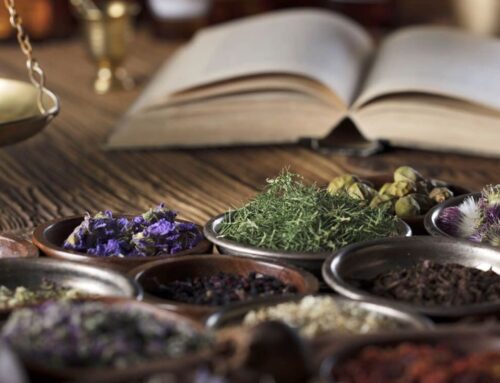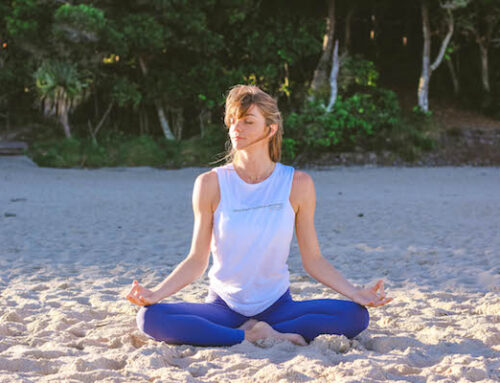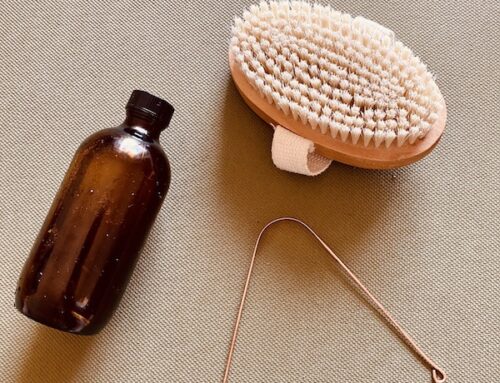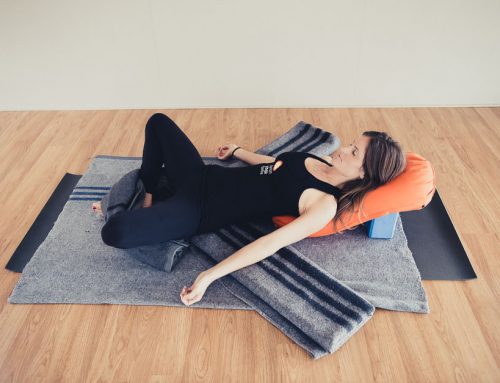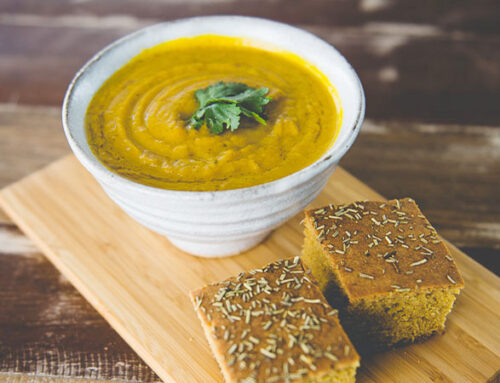Written by Brook McCarthy

In Ayurveda, every person has a different constitution comprising an individual combination of the five elements, and thus the three principles called doshas – vata, pitta and kapha – with one dosha usually dominating. As kapha predominates in winter, kapha imbalance is common to all constitutions in this season.
A predominance of kapha, composed of water and earth elements, means a sluggish and moist internal environment which is an ideal breeding ground for viruses to thrive. To counteract this and keep your doshas balanced, it is important to build up your immune system and keep warm and dry.
Warm, cooked foods for winter
Winter is not the time for salads; warm, cooked foods such as curries and soups are best for keeping our digestive systems powering and fortifying our internal defenses. “Green vegetables are ideal for wintertime, as are fruits which are rich in vitamin C,” says Jacinta McEwen, Byron Yoga Centre Ayurveda teacher trainer. “Oranges are a good source – so long as they are picked ripe, which most of those sold in the supermarket are not.”
Food sources of vitamin C are preferable to supplements because ascorbic acid vitamin C is acidic, an environment in which bugs thrive. Chywanprash Ayurvedic paste is a rich source of vitamin C and boosts immunity while also being a whole system tonic.
Sitopladi powder helps to clear sinuses, eliminate mucus and clear lymphatic congestion. “Best of all, it tastes good so children are quite receptive to taking it,” says Jacinta. “You can simply sprinkle it on meals or add it to a glass of water.”
Echinacea is also a great preventative health tonic for winter, being both antibiotic and anti-viral.
Oils for health
Our nervous systems dry out in winter; oil taken internally and externally helps to keep us lubricated. “If you are really kapha imbalanced, only add a little ghee or ‘friendly oils’ to your cooking,” says Jacinta. “It’s a fantastic season for applying oils in body self-massage, but if you don’t have the time for this, just applying black sesame oil to your feet before you go to bed will give you deeper sleep and will nourish your nervous system.”
Black sesame oil is ideal for external application for all doshas in winter, best applied warm. Almond oil can also be used, though it is not as medicinal nor as deeply penetrating and lubricating.
Drinking a few cups of hot water mixed with some fresh cut ginger, squeezed lemon and honey every day works as an anti-inflammatory and will help reduce the incidence and severity of coughs and colds. Lemon also cuts through lymphatic system stagnation, which helps the lymphs to trigger and amplify our immune response when infection is recognised in the body.
Looking after your kapha organs
In winter, it is particularly important to look after your nose, mouth and tonsils. As well as ginger, honey, lemon tonics and lubricating foods, oiling your nostrils with black sesame oil or Nasya oil can help lubricate and warm the area. Apply three drops of either black sesame or Nasya oil in each nostril and massage up the sides of your nostril and nose.
Keeping warm and rested
To survive and thrive during the colder months, it’s important to keep warm and rested. While this is common sense, it’s amazing how many of us neglect it; going out at night inadequately dressed for the cold, kick-starting a vigorous new exercise regime in an attempt to throw off winter lethargy and excess weight, and socialising extensively to avoid feeling lonely at home in the cold and dark.
Warming yoga poses include Utkatasana (powerful pose), Utthita Parsvakonasana (extended side angle pose), and Virabhadrasana II (Warrior II), preceded by some warm-up rounds of Surya Namaskar (salute to the sun).
“Winter has always been a time for hibernation and, to maintain good health this winter and avoid the many bugs and viruses floating about, being well rested is central,” says Jacinta. “Exercise regularly and lightly, wear enough clothes and warm colours, avoid daytime naps and instead get to bed well before midnight to have a decent eight-hour – or more – long sleep. Sleep is one of life’s best health tonics.”
Related articles
Tonics mentioned in this article can be purchased from www.mullumherbals.com.

